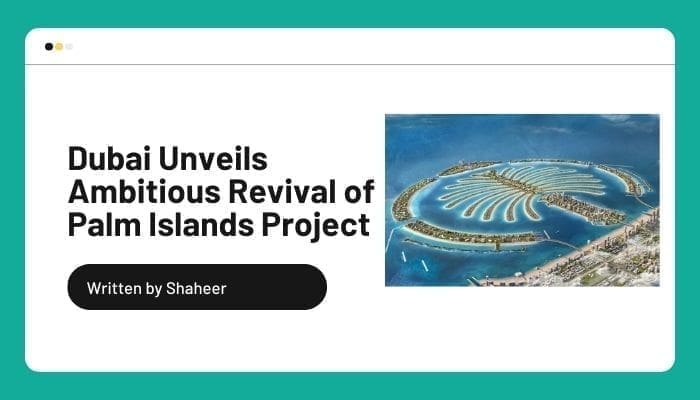The ruler of Dubai has resurrected plans to build a man-made, palm-shaped archipelago off its coast, which had been put on hold following the financial crisis.

According to new plans approved by Sheikh Mohammed bin Rashid, the Palm Jebel Ali development will include dozens of hotels, resorts, offices, and luxury homes, as well as more than 60 miles of beach.
The massive project began in 2002 and is a larger replica of the adjacent Palm Jumeirah, a sought-after property hotspot popular with Russian oligarchs fleeing Western sanctions.
While the artificial land mass has been finished, construction on Palm Jebel Ali was halted shortly after the housing market in Dubai plummeted in 2008. Only a minor portion of the infrastructure had been constructed at the time.
The project has been resurrected following a significant increase in Dubai home prices. Sheikh Mohammed approved plans for the land’s development as part of the city’s updated urban masterplan.
“Development is a non-stop journey in Dubai,” Sheikh Mohammed stated in a statement.
Palm Jebel Ali is one of three artificial island complexes envisioned by the government to establish the city state as a tourist and ultra-wealthy resort.
Residents of Palm Jumeirah, its smaller twin, include David and Victoria Beckham, who possess a seven-bedroom mansion among its artificial fronds. Roman Abramovich, the former owner of Chelsea Football Club in Russia, was reportedly said to have viewed houses there.
A third development, Palm Deira, has been trimmed back and renamed “Dubai Islands” after being renamed Palm Deira.
Palm Jebel Ali will be the largest of the complexes, spanning seven connected islands and encompassing eight square miles – more than double the size of Palm Jumeirah.
The huge construction features a 12-mile breakwater built from dredged up sand and blasted mountain granite. The structure provides an outer protective ring around the interior landmasses, shielding them from severe waves.
Behind the barrier are 17 curled, sandy limbs that branch from an almost four-mile stem, resembling a palm tree from above.
The initiative, led by state-owned developer Nakheel, would house 35,000 households and house 80 hotels and resorts, according to Dubai’s government.
Previous ideas included beachfront residences on stilts that promised to create magnificent ocean sunsets “an everyday experience” for homeowners, but it is unclear whether these have been maintained in the latest proposals.
According to Simon Baker, managing director of Dubai-based real estate agency Haus & Haus, rumors about the project’s rebirth had been circulating for months prior to the formal announcement.
Due to its comparably weak Covid rules, Dubai’s housing market grew at the quickest rate in the world throughout the pandemic. The city was swamped with purchasers from Europe and America fleeing the country’s closure.
Selling prices for the most costly residences increased by 50% during the epidemic, with Knight Frank analysts projecting another 13.5 percent increase this year.
According to Mr Baker, the cost of property per square foot in Dubai remains low when compared to other famous cities such as London and New York.
Whereas luxury property in London may cost $3,000 to $5,000 per square foot, he claims it is closer to $2,000 in Dubai.
“To those willing to pay, that sounds quite reasonable, even though they have gone up,” Mr Baker continued.
“We’ve already had wealthy clients call us this week, asking for 10 villas and saying they’re willing to spend $100 million.”
“So the issue is likely to be availability rather than demand.”
A five-bedroom luxury beachfront property on the Palm Jebel Ali is projected to cost between $3 million and $3 million.
Dubai has no income tax, which Mr Barker believes attracts many ultra-wealthy purchasers.
“The biggest reasons we’re hearing today are more to do with safety and security, and family life,” he said.
“People want to live in an environment where they can feel confident that their children will be safe walking down the street at night.”
In recent months, Nick Candy, the premium developer of One Hyde Park in London, shared this opinion when he stated that he was focusing his attention on Dubai’s property market.

